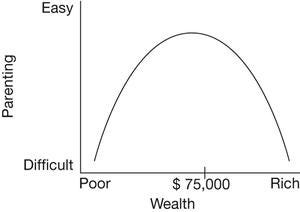There’s a theory in this book that, while too little of something may be a bad thing, too much of that thing may also be bad. That more is not always better. It’s only better to a point, and then the benefit may not only level off, it may actually decrease.
It’s a U shaped curve. Benefit rises as you climb out of scarcity, and then benefit decreases as you head into abundance.
An example might be class sizes. 50 kids in a classroom is too many – the teacher is spread too thin, you can’t pay attention to everyone, people get left out, chaos ensues. On the other hand 5 kids in a class is probably too few. There may not be enough difference of opinion to get any real discussion, there’s not enough diversity of thought.
Another example – income.
If you’re working multiple jobs to make ends meet, you simply can’t afford to give your kid anything they ask for. You likely end up teaching your child that they can put in hard work and earn the thing they want – they learn the value of effort and reward.
But at some point on that curve, the parent has plentiful income and can easily provide whatever thing is desired by their child. Here’s where things get difficult again. You have to say no because of your values, not because of a lack of resources. It’s easier to say no when you don’t have the ability. It’s harder to say no because of your principles.
It made me think about scarcity and abundance and my own values at work. When we have an abundance of time, do we still live our values?
If you don’t really have to complete a task until the end of the week, but you say you can get it done on Tuesday – do you really do it on Tuesday? Or do you let it slide because you can, given the abundance of time?
Do you tell a client ‘no’ for an early scope creep item that is small, when you still have an abundance of time and budget, based on the principle? Or do you agree, sidestep the difficult conversation, and allow it to slide?
Abundance allows us some generosity, but scarcity can forge your values. Are you living the same values when times are easy, as when they are hard?


